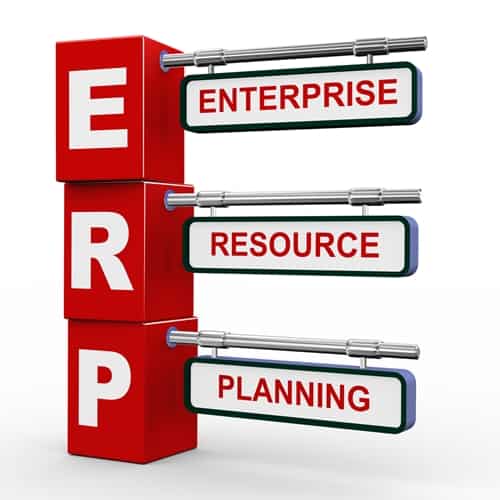Busting 4 Major Myths About ERP Software

What is the single most important aspect of running a business in today’s day and age? Is it ensuring the customer is always satisfied? Does it have to do with supply chain management and its ongoing success? Or should it be related to efficiency and ensuring that productivity is maximized?
Enterprise resource planning helps organizations large and small accomplish all of these mission-critical aspects to success and growth. With a variety of software solutions to choose from – including the gold standard, Microsoft Dynamics 365 Business Central – ERP grants businesses with the capability to increase their visibility into every single operational aspect of their company so leaders can make smarter, more informed decisions.
Yet with change being what it is – inherently difficult, more so for some than others – millions of companies have yet to jump aboard the ERP train. Their reticence may be informed by misconceptions about this technology, of which there are many.
To once and for all set the record straight, here are a few of the most common myths about ERP systems and where the truth actually lies:
Myth No. 1: ERP installation and implementation is expensive
The beauty of ERP solutions lies in their set-up and configuration to a customer’s specific requirements. In essence, when your company is set up in terms of various back-office functions and systems, ERP can be adjusted to best fit your unique business situation. The problem here is, ERP is highly technical in nature and configuration may need to be handled by a professional, which costs money. Purchasing the licenses, as well as the services of an expert team to handle installation, can seem like a significant investment.
However, ERP software is not one-size-fits-all. You can purchase only certain modules if you so choose. For instance, Microsoft Dynamics 365 is sold has functional suites. Applications include:
- Accounting & Finance
- Manufacturing
- Sales & Marketing
- Customer Service
- Field Service
- Project Services Automation
The TM Group will work with you, so you only select the modules that align with your needs. Whatever your budget is, we can offer a package that is within your company’s financial means without compromising on quality.
Myth No. 2: ERP only makes sense for large organizations
When you think of this term, big business undoubtedly immediately comes to mind. But if you look up the word in the dictionary, enterprise is synonymous with business and has nothing to do with its size.
While it is true that in the early days, ERP software was primarily leveraged by major corporations, often with an international presence, that is no longer the case. Again, because ERP solutions are fully configurableable and scalable, they’re sold by user which allows the solution to scale for larger organizations as well as be affordable for smaller organizations. Designed to meld to the needs and structure of the company, ERP solutions can actually benefit smaller companies even more than large enterprises because the all-in-one capabilities of these solutions lend themselves well to environments where employees have many functional “hats” to wear.
Furthermore, ERP software is industry-agnostic. Whether you’re in manufacturing, retail, accommodations, healthcare, field service, educational institutions or virtually any other, Microsoft Dynamics 365 Business Central is built to help any organization in any sector succeed. No matter your industry, The TM Group can help.
Myth No. 3: ERP implementation takes forever
The time it takes for ERP solutions to go into place is yet another aspect that is greatly exaggerated. Just as every business is unique, the same goes for every ERP implementation. In short, how long it takes depends on a variety of aspects. These include how many people will be using the system, the size of the company (generally, the smaller the business, the less time required), availability of resources and the amount of data that must be migrated. For larger implementations, a phased go-live approach to various functional areas or locations may allow the realization of quicker benefits from the investments in a new ERP system while the project continues to be rolled out organization wide.
The TM Group specializes in CRM and ERP implementations and will hold planning meetings with your team so you know exactly what the process will entail and how long you can expect it to last, barring any unforeseen circumstances.
Myth No. 4: ERP and CRM are one and the same
Given that they’re different abbreviations, one would think that enterprise resource planning and customer relationship management are easily discernible from each other. However, many people operate under the assumption that if you have one, obtaining the other is redundant.
While both software programs include many similar functionalities – such as invoicing, data management and order fulfillment – they have more contrasts than likenesses. For starters, ERP is more inclusive and helps with planning and the ongoing management of a company from an operational standpoint. CRM is more specific to dealing with customers. In short, whereas CRM supports efforts that are in front of the camera, ERP handles business tasks that are more behind the scenes.
However, these bounds are blurring as CRM and ERP vendors are rounding out their offerings to include both back office and front office components. Microsoft even removed the CRM acronym from their product names. This can be confusing when both Microsoft Dynamics 365 CRM and ERP suites contain redundant functional areas like field service and jobs. However, The TM Group would be happy to help yor company best configure a Microsoft Dynamics solution for your company. Since our founding in 1984, we’ve helped thousands of organizations reach new levels of efficiency. Contact us today to learn more.
Sources:
http://www.winman.com/blog/9-common-misconceptions-of-erp-software
https://www.brainsphereit.com/myths-about-erp-software/
https://www.planettogether.com/blog/5-misconceptions-about-erp-systems
https://www.cio.com/article/3253564/crm-vs-erp-whats-the-difference-and-which-do-you-need.html


